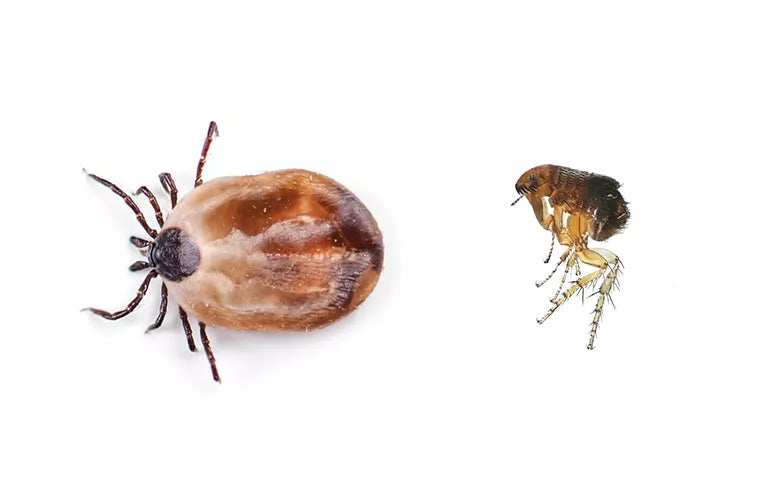Fleas And Ticks Advice For Pet Owners

This month I’d like to talk about fleas and ticks – those miniscule little insects (part of the Siphonaptera or blood sucking group) that can literally get under your pet’s skin and cause chaos. But first of all, let me tell you why they literally love this time of year.
May is usually the time of year when things are warming up. In the UK we’ve had a mild winter (so far anyway) but when we get to a warmer part of the year (around May time) we can see that the temperature is rising.
Unfortunately, this is when fleas like to wake up after laying dormant in your carpet or upholstery for many months and emerge from the pupae stage. Of course, the use of artificial heat (central heating systems in our homes) provides the perfect breeding ground for them.
This means that many months ago they jumped onto your pet, got a free ride into the house and after they fed for a while, decided to have a rest and retire as the colder weather crept in. And this is where they'll stay for a while.
How to spot them
The thing is, if you own a cat they are usually so good at grooming themselves. So if your cat appears to be over doing it a bit this might be a sign of fleas. Check your pet by dividing the fur and if you see any dark brown or back spots then further investigation is necessary.
If there are black spots then this could be flea dirt and a way to check is to place it onto a damp tissue and see if there are any dissolving traces of red. If there are it means you have found flea dirt and the red is the blood that the flea has digested. If you spot something darker brown and around 1 – 2mm in size then this is probably a flea.
Ticks on the other hand will bury their mouth parts into the skin and are only just visible. However, on close inspection you could spot the legs at skin level, but remember the head is buried. Don’t try to remove the tick with your fingers as you might leave the head and this could cause irritation or even an infection. If you are sure there are ticks ask your vet for a tick removal tool and either ask an expert how to use it properly or try to do it yourself.
So how do you treat them?
There are countless powders, spot on’s, collars, oral formulations, injections and sprays available to fight ticks and fleas so have a look around, ask your vet and do some research. And remember, your house may also need to be treated all year round as warm weather and central heating kicks these little mites into a whole new lease of life!
May is usually the time of year when things are warming up. In the UK we’ve had a mild winter (so far anyway) but when we get to a warmer part of the year (around May time) we can see that the temperature is rising.
Unfortunately, this is when fleas like to wake up after laying dormant in your carpet or upholstery for many months and emerge from the pupae stage. Of course, the use of artificial heat (central heating systems in our homes) provides the perfect breeding ground for them.
This means that many months ago they jumped onto your pet, got a free ride into the house and after they fed for a while, decided to have a rest and retire as the colder weather crept in. And this is where they'll stay for a while.
How to spot them
The thing is, if you own a cat they are usually so good at grooming themselves. So if your cat appears to be over doing it a bit this might be a sign of fleas. Check your pet by dividing the fur and if you see any dark brown or back spots then further investigation is necessary.
If there are black spots then this could be flea dirt and a way to check is to place it onto a damp tissue and see if there are any dissolving traces of red. If there are it means you have found flea dirt and the red is the blood that the flea has digested. If you spot something darker brown and around 1 – 2mm in size then this is probably a flea.
Ticks on the other hand will bury their mouth parts into the skin and are only just visible. However, on close inspection you could spot the legs at skin level, but remember the head is buried. Don’t try to remove the tick with your fingers as you might leave the head and this could cause irritation or even an infection. If you are sure there are ticks ask your vet for a tick removal tool and either ask an expert how to use it properly or try to do it yourself.
So how do you treat them?
There are countless powders, spot on’s, collars, oral formulations, injections and sprays available to fight ticks and fleas so have a look around, ask your vet and do some research. And remember, your house may also need to be treated all year round as warm weather and central heating kicks these little mites into a whole new lease of life!
-
Posted in
dogs and fleas, dogs and ticks, flea advice for pet owners, how to treat dog fleas, how to treat dog ticks, Siphonaptera, tick advice for pet owners





